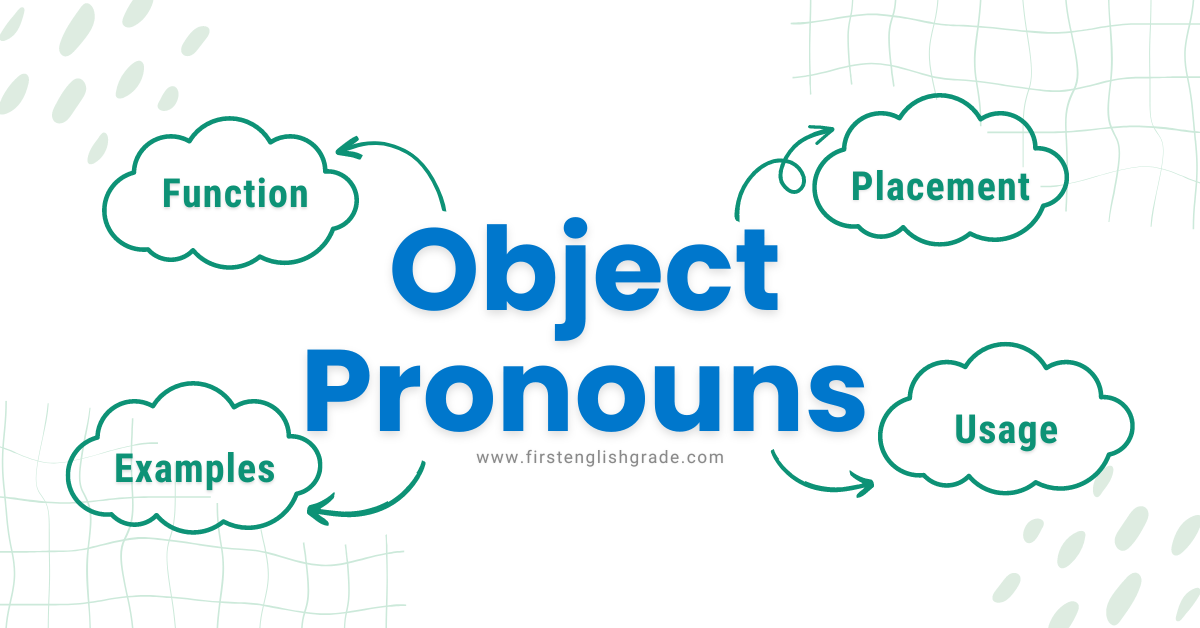Imagine telling a story about your friend, and you’re tired of saying their name repeatedly. That’s where object pronouns step in! They’re like name tags for nouns, making your sentences less repetitive and more elegant. Let’s understand the object pronouns in English and learn how to use them like a pro.
What Are Object Pronouns?
Object pronouns are a type of personal pronoun used in sentences to replace nouns that receive the action of a verb or are the recipients of an action. They play the role of the receiver of the action and help avoid repetition by substituting the noun that would otherwise be used.
List of Object Pronouns
- Me
- You
- Him
- Her
- It
- Us
- Them
Types of Object Pronouns
Object pronouns make sentences smoother and more concise. There are two types: direct object pronouns and indirect object pronouns.
Direct Object Pronouns:
A direct object is a noun or pronoun that receives the action of a verb directly. In other words, it’s the thing that the action is being done to. For example, in the sentence “She ate the cake,” “the cake” is the direct object because it’s the thing being eaten.
Direct object pronouns replace these direct objects to avoid repeating the noun. In English, the direct object pronouns are often the same as the subject pronouns:
- She ate the cake. (original sentence)
- She ate it. (using a direct object pronoun)
Indirect Object Pronouns:
An indirect object is a noun or pronoun that indicates to whom or for whom the action of the verb is performed. It usually comes after a verb and answers the question “to/for whom” or “to/for what.” Indirect object pronouns replace these indirect objects.
For example, He gave us a gift.
- To whom did he give a gift? Us.
- “Us” replaces the recipients of the gift.
Placement of Object Pronouns
Alright, so you’ve got these smart object pronouns to replace nouns. But where do they actually go in your sentences? Don’t worry, we’ve got your back! In English, object pronouns usually snuggle right next to the verb. Let’s take a look:
Example 1:
She invited us to the party.
- “Us” is the object pronoun.
- It snuggles up right after the verb “invited.”
Example 2:
Can you help me with this?
- “Me” is the object pronoun.
- It’s snugly placed next to the verb “help.”
Example 3:
They’re teaching him English.
- “Him” is the object pronoun.
- It’s comfortably situated right beside the verb “teaching.”
By placing object pronouns right next to the verb, you’re ensuring your sentences flow smoothly and communicate your message clearly.
Using Object Pronouns in Different Tenses
Whether you’re talking about the past, present, or future, object pronouns stay loyal and slide into their spots near the verb. Let’s take a journey through time with some examples:
Present Tense:
We see them at the park.
- “Them” is the object pronoun.
- It’s comfortably placed next to the present tense verb “see.”
Past Tense:
He met her last week.
- “Her” is the object pronoun.
- It’s smoothly tucked next to the past tense verb “met.”
Future Tense:
I will meet you tomorrow.
- “You” is the object pronoun.
- It’s cheerfully placed beside the future tense verb “will meet.”
Object Pronouns vs. Reflexive Pronouns
Now, don’t get confused between object pronouns and reflexive pronouns. While both types of pronouns sound similar, they have distinct roles in sentences.
Object pronouns take the place of nouns that receive the action. Reflexive pronouns, on the other hand, add a touch of self-reference to actions. They’re used when the subject and the object of the action are the same person or thing.
Example:
She taught us how to dance.
- “Us” is the object pronoun, standing in for the recipients of the dance lesson.
She taught herself to swim.
- “Herself” is the reflexive pronoun, indicating that she learned to swim on her own.
Here’s a tabular comparison between object pronouns and reflexive pronouns to make the distinction even clearer:
| Object Pronouns | Reflexive Pronouns | |
| Function | Replace nouns that receive the action | Add self-reference to the action |
| Examples | She loves him. | She loves herself. |
| We see them at the park. | He congratulated himself. | |
| Usage | Replaces direct or indirect objects | Refers back to the subject |
| Purpose | Avoids repetition, makes sentences smoother | Emphasizes self-involvement |
| Placement | Next to the verb | Next to the verb |
| Key Pronouns | me, you, him, her, it, us, them | myself, yourself, himself, herself, itself, ourselves, yourselves, themselves |
Subject and Object Pronouns
To add another layer of clarity, let’s understand the difference between subject and object pronouns.
Object pronouns come into play when an action is being done to someone or something. They replace nouns that receive the action of the verb. Subject pronouns, on the other hand, are the stars of the sentence. They represent the doers of the action—the ones performing the action.
Examples:
Can you pass the message on to her? (Here, “her” is the object pronoun, stepping in for the entity that is receiving the action— receiving the message.)
He is a talented musician. (Here, “he” is the subject pronoun, indicating who is performing the action—being a musician.)
Object Pronouns Examples
Here are some example sentences for you. These sentences showcase the use of subject, object, and reflexive pronouns in different contexts, helping you become more comfortable with their usage in various scenarios.
- She loves to read, and she often loses herself in books.
- They went to the park and played with us.
- We are going to the movies to treat ourselves.
- I saw him at the cafe yesterday.
- She helped me with my math homework.
- He made a sandwich for her.
- They are proud of themselves for completing the project.
- We want to show you our new painting.
- He introduced himself to the new neighbors.
- They gave a gift to us on our anniversary.
Object Pronouns Exercises
Time to put your skills to the test!
Exercise 1.
Choose the correct object pronoun to complete each sentence.
- She gave the gift to_____________.
a) myself
b) you
c) her
d) he
- They’re visiting _____________ next weekend.
a) we
b) them
c) she
d) it
- Can you pass the book to _____________?
a) us
b) me
c) they
d) himself
- I saw _____________at the party.
a) she
b) you
c) them
d) we
- He’s teaching the new dance routine to _____________.
a) himself
b) him
c) us
d) she
- We enjoyed the movie all by _____________.
a) itself
b) yourself
c) themselves
d) ourselves
- The cat is chasing the mouse. _____________is fast.
a) it
b) we
c) them
d) her
- She helped _____________with the project.
a) her
b) they
c) me
d) us
- They gave a gift to _____________on your birthday.
a) them
b) he
c) you
d) she
- He introduced _____________to the new neighbors.
a) him
b) us
c) herself
d) himself
Exercise 2.
Fill in the blanks with the correct pronouns from the word bank:
- I – you – he – she – it – we – they
- me – you – him – her – it – us – them
- myself – yourself – himself – herself – itself – ourselves – yourselves – themselves
- _________and _________are going to the park with _________.
- _________made breakfast for _________this morning.
- _________gave a gift to _________on your birthday.
- _________introduced _________to the new student in the class.
- _________are going to the movies to enjoy a film by _________.
- _________is raining outside, so _________’s best to stay indoors.
- _________can help _________with his math homework.
- _________are proud of _________for finishing the project.
- _________saw _________at the party last night.
- _________taught _________how to play the piano.
Answer Keys
Exercise 1.
- a) myself
- b) them
- b) me
- c) them
- d) her
- d) ourselves
- a) it
- c) me
- c) you
- d) himself
Exercise 2.
- He and she are going to the park with us.
- I made breakfast for myself this morning.
- They gave a gift to you on your birthday.
- She introduced herself to the new student in the class.
- We are going to the movies to enjoy a film by ourselves.
- It is raining outside, so it‘s best to stay indoors.
- You can help him with his math homework.
- They are proud of themselves for finishing the project.
- I saw him at the party last night.
- She taught herself how to play the piano.




